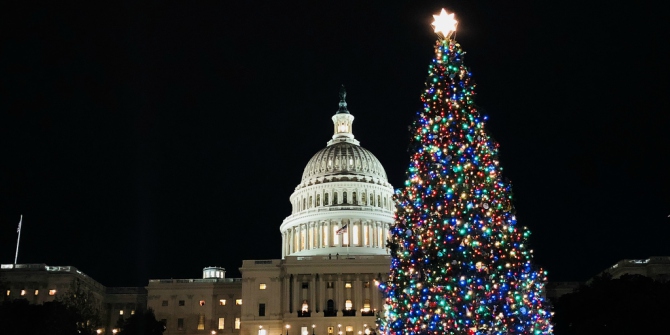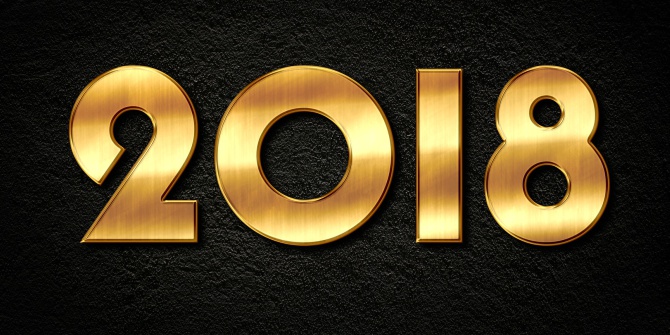 Following President Joe Biden’s decision not to seek the Democratic Party’s presidential nomination, Thomas Gift looks at what’s next for the party and the 2024 election. He writes that while it now seems inevitable that Democrats will fall in line behind Vice-President Kamala Harris as their nominee, it’s not obvious that this will markedly increase their odds of winning compared to when Biden was the candidate.
Following President Joe Biden’s decision not to seek the Democratic Party’s presidential nomination, Thomas Gift looks at what’s next for the party and the 2024 election. He writes that while it now seems inevitable that Democrats will fall in line behind Vice-President Kamala Harris as their nominee, it’s not obvious that this will markedly increase their odds of winning compared to when Biden was the candidate.
Were you surprised that Biden bowed out of the race?
I was, but maybe I shouldn’t have been. Biden was in a bad place. Every time a Senator or House member called for Biden to step down, it hurt him in the polls. Biden dug in his heels. Democrats got exasperated. They called on Biden to step down again. Biden said no. And the vicious cycle continued. That wasn’t sustainable. Part of the problem was that top lawmakers on Capitol Hill are used to strong-arming subordinates into compliance. But they couldn’t boss Biden around like he’s a junior member of Congress. Biden needed to make the decision on his own timeline. This was Biden’s last foray in professional politics, and he’d spent his career eyeing the White House. He wasn’t going to give that up easily.
Despite still suffering from COVID-19, I am surprised that Biden announced his decision by posting a letter on X, and that he still hasn’t made any type of public appearance. One silver lining for Democrats is that, by waiting until only a few weeks before the Democratic convention to drop out, and importantly, by endorsing his Vice President, Kamala Harris, Biden short-circuited what could have been a drawn-out, bitter fight among potential replacements. Now, it seems almost inevitable that Democrats will fall in line behind Harris.
Will Harris have to vie for the nomination?
With Biden endorsing her, Harris is the presumptive nominee. Party elites say there will be an orderly, transparent process to find a successor. But I suspect that the convention will be a coronation. Even if Biden hadn’t endorsed her, it was already going to be hard for another candidate to challenge Harris. Not only is she Biden’s Vice President, but she’s also the first woman, and woman of color to hold that position. Other names, such as Pennsylvania Governor Joshua Shapiro and California Governor Gavin Newsom, have already endorsed Harris. One interesting wrinkle is that former Senator Joe Manchin, who recently switched from Democrat to independent, is reportedly considering re-registering as a Democrat and running. Some experts have floated the potential of a “mini-primary” between now and the convention, but it’s doubtful this will happen. One concern with the perception that this is a coronation is that Harris’s support looks like it’s coming from the top-down by Democratic elites. Trump’s support looks like it’s coming from the bottom-up by the Republican base. Some rank-and-file Democrats may resent that they had the chance to select their nominee pulled out from under them.
What do you think of the pressure campaign to remove Biden from the ticket?
A key question was what actually motivated the pressure. Biden’s mental acuity was clearly the main story. But in the same breath, you also heard Democrats referencing the polls and saying they didn’t think Biden had a pathway to victory in November. Everyone from former House Speaker Nancy Pelosi to Senate Majority Leader Chuck Schumer seemed convinced that Biden was on track to lose. These two points are related, of course, but making the case that Biden should drop out because of polling was more precarious. There can’t be a norm that just because a party’s presumptive nominee starts to decline in the polls, that party elites can discard what voters demanded in the primaries. That undercuts the democratic process in primaries that’s been in place since the McGovern-Fraser commission in the 1970s. It’s not as though Biden had no chance at all of beating Trump. After all, almost every expert thought Trump would lose in 2016, and he beat Hillary Clinton. This isn’t to discount the dire straits Biden was in. The polls looked depressing for him. But Democrats who think the alternative will absolutely do better could be wrong. It’s not obvious that Democrats markedly raise their odds of winning with Harris.

President Joe Biden and Vice President Kamala Harris walk through the Cross Hall as they arrive to the East Room for an Executive Order signing on Artificial Intelligence, Monday, October 30, 2023 at the White House. (Official White House Photo by Adam Schultz); “P20231030AS-0514” by The White House is United States government work
How does this change the contours of the presidential race?
Biden dropping out makes the election a referendum on Trump, and not Biden’s age. If Harris is the nominee, she’ll have a chance to keep the spotlight on Trump’s challenges to democratic institutions and norms. She’ll have the chance to keep the focus on the chaos of Trump’s first term in office and his demagoguery. She’ll have the chance to remind voters of all the fallout of Trump’s two impeachments, January 6th, and all the scandals and mini scandals in between. Biden tried to do that, but the distraction of whether he should exit the race was becoming so great that he was spending more time fending off critiques from Democrats than he was waging his campaign against Trump. But Democrats should be under no illusions about the strength of Trump’s momentum right now. The MAGA base is energized. It also seems to me that Democratic elites are persuading themselves that Harris is a more popular choice than she is. The conventional wisdom that Harris wasn’t a particularly strong candidate seems to be fading. Yet there’s a reason why Republicans have been saying for a while that a vote for Biden is a vote for Harris — because they see her as a liability on the ticket.
Does Kamala Harris have a better chance of beating Trump than Biden?
This was going to be a close race regardless of who was running against Trump. Even though Biden’s polling looked increasingly worse in recent weeks, Trump has a ceiling on his support, so I don’t think it was true that Biden had no shot of winning. To my mind, the polling is somewhat equivocal on whether Harris gives the Democrats a better chance of winning the White House. What I do think she does is make it more likely that the so-called “double-haters”—those who dislike both Biden and Trump—turn out to the ballot box and vote Democrat, including on down ballot races. One point to keep in mind is that perceptions of Harris may be more malleable than those of Biden, which could be good or bad for her. Americans know Harris, but she’s not been in the limelight like Biden. For the first several years of the Biden administration, Harris was relegated to a suite of relatively low-profile issues. In 2019, Harris was the first major candidate to flame out of the 2020 Democratic primaries due to a lack of support. So, she’ll need to make a better impression. That means performing well at a debate, if there is one, and clearly defining her candidacy by a strong speech at the convention.
How does this affect the White House in the short-term?
According to Biden’s brother, the president’s health did play a role in his deciding to stand down. That comment raises some challenges for the White House. For now, J.D. Vance seems to be one of the only people asking: If Biden doesn’t have the mental acuity to run for re-election, then does he have the mental acuity to remain as Commander-In-Chief? It’s not a totally unreasonable question. For Biden, resigning the presidency to allow Harris to run as an incumbent was always going to be a step too far. It’s already been a bruise to Biden’s ego to see so many of his allies—lawmakers, donors, pundits, and the like—questioning his cognitive fitness. With Biden bowing out of the race, however, I think you’re going to hear more and more from Republicans that Biden isn’t fit to serve until the next inauguration. As part of that, you’re also going to hear about invoking the 25th Amendment. It won’t lead anywhere. But it will be a GOP talking point. Democrats need to be wary of the possible unintended consequences of Biden exiting. If you’re a Democrat skeptical that Biden could beat Trump, one problem is solved. Yet Biden’s decision also invites a wave of new criticism that the party will have to manage in the coming months.
- Please read our comments policy before commenting.
- Note: This article gives the views of the author, and not the position of USAPP – American Politics and Policy, nor the London School of Economics.
- Shortened URL for this post: https://wp.me/p3I2YF-e7r






